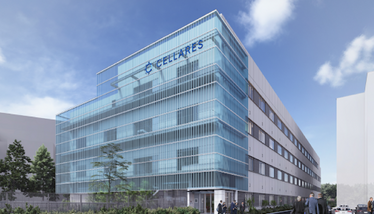This Week’s CGT News: Smart Cell Therapy Facility for Japan
Our latest news roundup reports on a cell therapy facility expansion in Princeton, a magnet to capture T cells, and more.
| 5 min read | News

Credit: Cellares
Smart cell therapy facility for Japan
Cellares and Mitsui Fudosan have announced plans to establish an automated, smart cell therapy manufacturing facility in Kashiwa City, Chiba Prefecture, Japan. The facility will support commercial-scale manufacturing of cell therapies, including CAR-T products, with operations expected to begin in 2026. The companies describe the facility as an “Integrated Development and Manufacturing Organization Smart Factory.” It will be equipped with Cellares’ automated technologies, including the Cell Shuttle and Cell Q platforms.
The facility is expected to employ approximately 350 staff and serve as a regional manufacturing hub, supporting both domestic and international developers. According to the companies, this expansion reflects growing demand for advanced therapy manufacturing capacity in Japan and the broader Asia-Pacific region.
“Cellares’ new facility in Kashiwa City will enable our pharma clients to supply Japan from Japan. Manufacturing cell therapies locally simplifies cold chain logistics, accelerates vein-to-vein time and reduces cost,” said Fabian Gerlinghaus, CEO and Co-Founder of Cellares.
Made Scientific expansion
Made Scientific, formerly known as BioCentriq, has expanded its GMP facility in Princeton, New Jersey, by an additional 12,000 square feet. The expansion is part of a $12 million capital investment aimed at scaling the company’s capabilities to support late-phase and commercial manufacturing of both autologous and allogeneic cell therapies.
The expanded facility includes six new ISO 7 cleanrooms designed for high-throughput production. It is outfitted with advanced bioreactors and automated cell processing technologies to support larger-scale operations. The Princeton site will serve as the company's headquarters and primary location for commercial manufacturing, complementing its Newark site, which focuses on phase I through III production and hybrid “client-in-plant” operations.
According to the company, the expanded footprint is intended to meet growing client demand for more integrated and scalable manufacturing solutions in the cell therapy space, particularly as programs move toward regulatory submission and commercial launch.
Rapid mycoplasma testing
Bionique Testing Laboratories and CDMO Cellipont Bioservices have announced a partnership to expand the use of rapid mycoplasma testing in cell and gene therapy manufacturing. The collaboration will integrate Bionique’s validated rapid detection methods into Cellipont’s cGMP workflows to streamline quality control and reduce batch release timelines.
Mycoplasma testing remains a critical requirement in the release of advanced therapy medicinal products, and traditional culture-based methods can delay manufacturing processes. By adopting rapid testing, Cellipont hopes to improve turnaround times while maintaining regulatory compliance and product safety.
Research
Using cell therapy in glioblastoma
Researchers at the University of Pennsylvania have shared early results from a phase I trial testing a dual-target CAR T cell therapy for patients with recurrent glioblastoma (GBM). The therapy is designed to hit two tumor-associated proteins – EGFR and IL13Rα2 – which are commonly found in GBM. Rather than delivering the cells systemically, the team infused the engineered CAR T cells directly into the cerebrospinal fluid.
Eighteen patients took part in the study. Of the 13 who had at least 1 cm of tumor left after surgery, eight showed some degree of tumor shrinkage after treatment. In most cases, the tumors started to grow again within a few months, but some patients had longer periods of stable disease. Two patients remained stable for more than six months, and three out of seven patients with at least a year of follow-up were still alive at the one-year mark.
The treatment was generally well tolerated, and analysis of cerebrospinal fluid and tumor tissue showed that the CAR T cells persisted and infiltrated the tumor. Researchers also observed activation of other immune cells, such as macrophages, in the tumor environment.
This trial builds on prior work by the Penn team exploring regional delivery of CAR T cells for brain tumors. By targeting two antigens at once, the approach is designed to reduce the chance of tumors escaping treatment due to heterogeneity. A phase Ib trial is planned to explore dosing and further evaluate response durability.
“These results reaffirm that we’re onto something with our dual target therapy, and that we have a good template that we can begin refining for even better outcomes,” said Donald O’Rourke, director of the Glioblastoma Translational Center of Excellence in the Abramson Cancer Center at Penn Medicine, and scientific advisor to the trial. “Periods of stability, when tumors shrink or don’t grow, vastly improve the quality of a patient’s life. Our goal is to refine the treatment so that more patients experience longer-lasting results.”
Magnets to the rescue in CAR T accessibility
Researchers at Case Western Reserve University have developed a device designed to isolate and enrich T cells from a small volume of whole blood, eliminating the need for leukapheresis.
The CAPGLO device uses a combination of magnetic and optical cell sorting strategies. Magnetic nanoparticles “capture” T cells and fluorescent tags make them “glow”; thus, enabling high-purity isolation. The device is small enough to fit on a benchtop and processes just a few milliliters of blood, making it potentially suitable for decentralized use, including in outpatient or lower-resourced settings.
Initial experiments have shown that T cells isolated via CAPGLO are viable and can be expanded and modified for use in CAR T manufacturing workflows. While the device is currently at the proof-of-concept stage, the team is working to validate performance and scalability. Their hope is that the device can help address CAR T accessibility issues, particularly in regions or clinical contexts where apheresis and centralized processing are logistically or financially challenging. It also opens the door for potential use in pediatric or low-weight patients, where blood volume constraints make standard leukapheresis impractical.



















